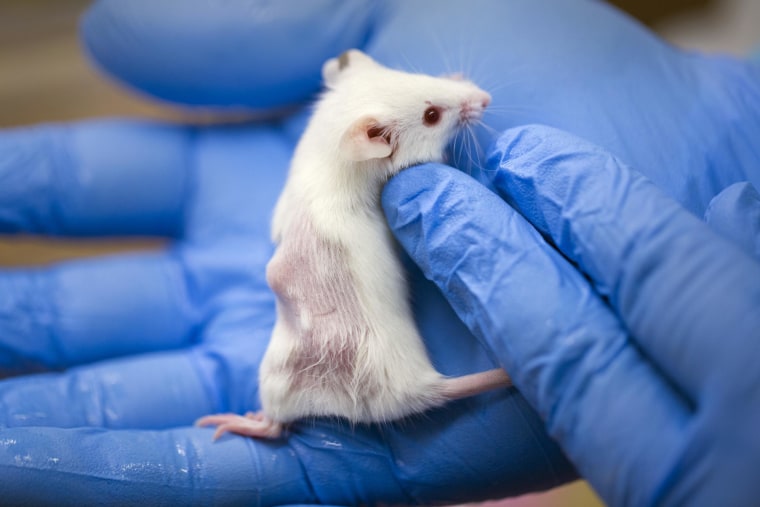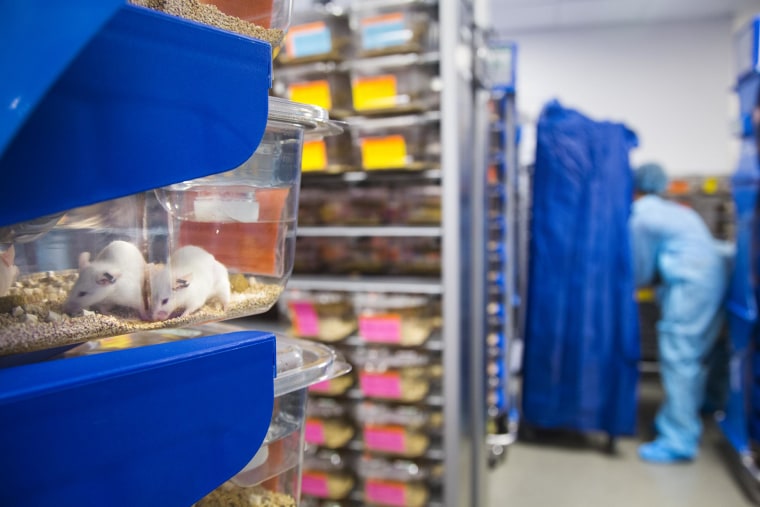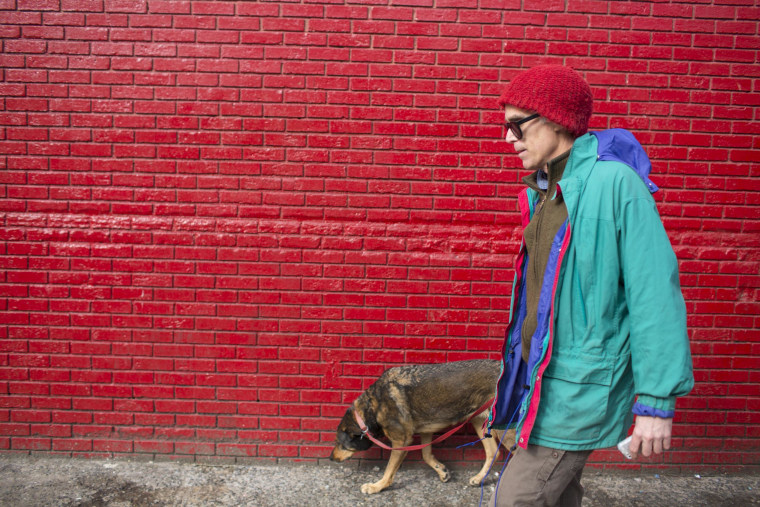The bump on the back of the mouse is the size of a Tic Tac breath mint, or, possibly, a small pea.
But for Matt Freedman, a New York artist grappling with a rare and deadly neck cancer, the tiny tumor — his tumor — represents a last-ditch hope for a healthy future.
Freedman, 57, who was diagnosed with adenoid cystic carcinoma in 2012, is among a small but growing group of cancer patients turning to a kind of very personalized medicine in which animals serve as stand-ins to treat human disease.
Called mouse avatars in some circles — like the virtual characters in online games — the critters are implanted with pieces of tumor harvested from their human counterparts. They’re then propagated to create a colony of animals in which to test drugs and other treatments that would be too aggressive — or take too long — to attempt in a person.

“Right now I’m living my life more or less normally and hoping this can happen in parallel,” said Freedman, who has already undergone radiation and chemotherapy to fight the tumors that spread from his tongue and salivary glands to his lungs.
“If a drug does emerge from this, it could be more targeted and less toxic,” he said. “It’s a whole different idea about what a lab rat is.”
Regular lab rats have been used by scientists for decades, of course, including in experiments in which they were implanted with people’s tumors. But now commercial companies like Champions Oncology of Hackensack, N.J., the firm behind Freedman’s mice, are offering ordinary patients the chance to tailor their treatments to what works best for them.
"It’s a whole different idea about what a lab rat is.”
“Most patients don’t realize that there is no major rhyme or reason for an oncologist who has four or five drugs to use, no real test to say we should use this one or that one,” said Dr. Ronnie Morris, president and director of Champions, where 450 patients have been implanted since 2007.
“There are really good reasons for taking the most effective drug early on. We certainly can’t clone people, so the second-best option is to take the tumor out and let it grow outside the body," said Morris, an internist.
But while there’s been some success, there’s limited evidence that treatments tested on personalized mice can help cancer patients live longer, experts say.

In addition, the cost of growing and testing the mice, sometimes for dozens of potential drugs, can climb into the tens of thousands of dollars, fees that are not yet covered by health insurance — though that could change.
“The technique does not come without its limitations and pitfalls,” University of South Florida researchers evaluating avatar therapies wrote in a paper in the journal Cancer Letters last year.
For one thing, it can take months for implanted tumors to take hold and grow — sometimes longer than patients have to live. In Freedman’s case, his tumors were harvested in January, and it's still not quite clear whether they've been successfully grafted into the mice. Even if they have, it probably will be next January before the mice will be ready to test with some four dozen possible drugs.
“That’s one thing that gets lost in the noise,” said Matt’s brother, Dr. Joshua Freedman, a California neuropsychologist who helped spur the experiment. “In order for it to be useful in a person, they need a long lead time in mice.”
But for Matt Freedman, whose cancer, called ACC, is so rare it hasn’t been studied widely and has no known effective treatment, trying the mice made sense. “We’re only trying to get it to work in this one ACC,” Joshua Freedman said.
“In order for it to be useful in a person, they need a long lead time in mice.”
While it used to cost up to $25,000 out of pocket for the treatment, now patients pay about $1,500 to build an avatar and then $2,500 per test, Morris said.
Champions is a leader among more than 15 companies worldwide to offer commercial patient-derived tumor xenografts, or PDTX. Champions is working with about 250 patients a year now and expects the numbers to grow to between 500 and 700 annually, said Morris.
So far, there’s some evidence that testing cancer treatments in mice first pays off for humans. In 29 patients with rare sarcomas, cancer of the connective tissue, 22 successfully engrafted their tumors in mice and identified drug protocols, according to Champions researchers reporting in a recent issue of the journal Cancer. Six of those patients died before the testing was complete, but in 13 of the remaining 16, there was a correlation between the results of their tests and their outcome, the study found.

Freedman chronicled the ordeal of radiation and chemotherapy in a new book out Tuesday titled after the description of his slow-moving but lethal cancer: “Relatively Indolent But Relentless: A Cancer Treatment Journal.” He is feeling better these days, off prescription pain medications and back to teaching fine arts at the University of Pennsylvania School of Design. Next week, he'll have his three-month chest scan to tell whether the cancer has changed.
In the meantime, his mice are growing, preparing to become Freedman's surrogates for the treatment that could heal him. Patients typically don't view their mice in the labs that house 7,500 of the creatures, so when Freedman saw photos of his avatars, he said he was more moved than he expected.
"I feel a tremendous tenderness and gratitude toward them, as though they were willing little soldiers fighting in my behalf," he told NBC News. "The fact that I know they have no choice in the matter only makes me feel a greater sense of debt towards them."
